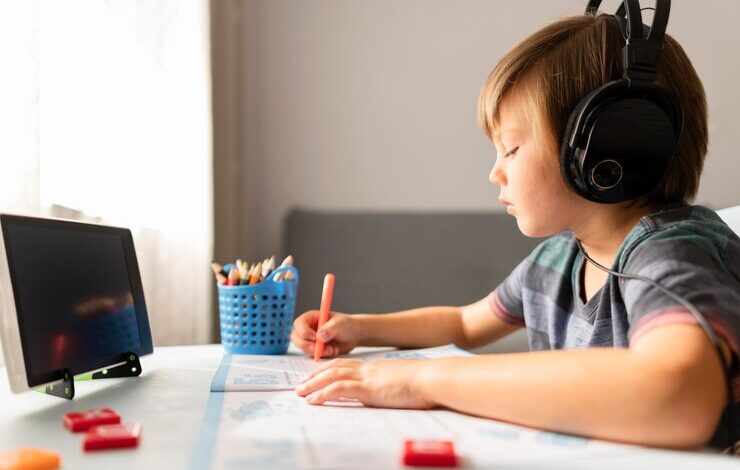Transforming Early Learning Through Online Primary Education

Primary education has changed dramatically in recent years due to online learning systems. Young learners, parents, and educators face new opportunities and problems as digital technology advances. Online primary education is changing early learning, with benefits and drawbacks and future promise.
The Emergence of Online Primary Education
History of Online Learning
Online education is new to primary school, but it has been around for decades. Online learning was once associated with universities and professional training. The COVID-19 pandemic increased its spread in primary schools worldwide, as lockdowns and social separation required online education.
The Digital Transformation in Primary Schools
Schools closed due to the outbreak, forcing educators to utilize digital tools and resources. This transition allowed technology to be permanently integrated into basic education. Online learning has been integrated into current education systems because educators and schools recognise its potential to improve learning.
Advantages of Online Primary Education
Flexibility and Accessibility
One of the advantages of online primary education is flexibility. Access to learning materials from anywhere at any time makes learning more personalised. Families with irregular schedules or in distant places with poor schools benefit from this flexibility.
Customised Learning Experiences
Online platforms often feature tools that support personalized learning paths, adapting to each student’s pace and style. This ensures that students fully grasp concepts before advancing, a level of customisation that is challenging to achieve in traditional classrooms with diverse student abilities and speeds.
Engagement Through Interactive Content
Digital learning environments frequently incorporate interactive content like videos, quizzes, and games, making learning more engaging for young students. This interactive approach helps maintain student interest and attention, crucial for effective early learning.
Access to Extensive Resources
The internet provides a vast array of educational resources, including e-books, articles, educational games, and virtual labs. Online primary education platforms can leverage these resources, offering students a richer and more varied learning experience than traditional classrooms might.
Challenges of Online Primary Education
Technological Barriers
Despite its benefits, online primary education is difficult. The devices and dependable internet needed for online learning are out of reach for many families. This digital divide can aggravate educational inequality, hurting some kids.
Reduced Social Interaction
Social isolation is a downside of online learning. Traditional classrooms foster social skills through peer and teacher interaction. Online environments can isolate young learners, impairing their social and emotional development.
Increased Parental Involvement
Online primary education often requires more parental involvement, especially for younger children who need help with technology and staying focused. This can be difficult for working parents or those who lack technological expertise.
Concerns About Screen Time
Online learning increases screen time, worrying parents and teachers. Screen time can affect young children by causing eye strain, poor posture, and decreased physical activity. Read the next part to see how modern online schools overcome these challenges!
Strategies to Overcome Challenges
Promoting Social Interaction
To counteract the lack of social interaction, online primary education platforms can include features like virtual classrooms, discussion forums, cooking clubs, debate clubs, drama clubs and group projects! Schools can also organize regular in-person activities and field trips to ensure students have opportunities to socialize and develop interpersonal skills.
Supporting Parents and Caregivers
Providing training and resources for parents can help them manage the challenges of online learning. Schools can offer workshops and materials to assist parents in understanding the technology and strategies for keeping their children engaged.
Balancing Screen Time
Educators can design curricula that balance screen time with offline activities. Including regular breaks, physical exercises, and hands-on projects can help mitigate the negative effects of prolonged screen use.
The Role of Teachers in Online Primary Education
Adapting Teaching Methods
Teachers are crucial to the success of online primary education. They need to adapt their methods for the digital environment, using multimedia resources, interactive tools, and varied strategies to effectively engage students.
Ongoing Professional Development
Continuous professional development is vital for teachers to stay current with the latest educational technologies and best practices. Training programs can equip teachers with the skills needed to create and deliver high-quality online lessons.
Building a Supportive Online Community
Creating a supportive and inclusive online community is essential for student success. Teachers can foster a sense of belonging and collaboration by encouraging participation, providing regular feedback, and facilitating peer interaction.
Future Prospects of Online Primary Education
Technological Innovations
Online primary education has a bright future thanks to technology. Online learning could become more immersive and participatory using AI, VR, and AR.
Hybrid Learning Models
More people will choose hybrid learning approaches, which combine online and in-person training. These approaches combine online and face-to-face learning.
Global Collaboration
Online primary education lets children collaborate with peers worldwide. This enhances their education and prepares them for a globalized society by broadening their cultural viewpoints.
Conclusion
Online primary education is changing early learning with its flexibility, personalisation, and resources. Despite technological obstacles and minimal social connection, the rewards are great. By overcoming these obstacles and embracing technology, online primary education can change young kids’ learning.





